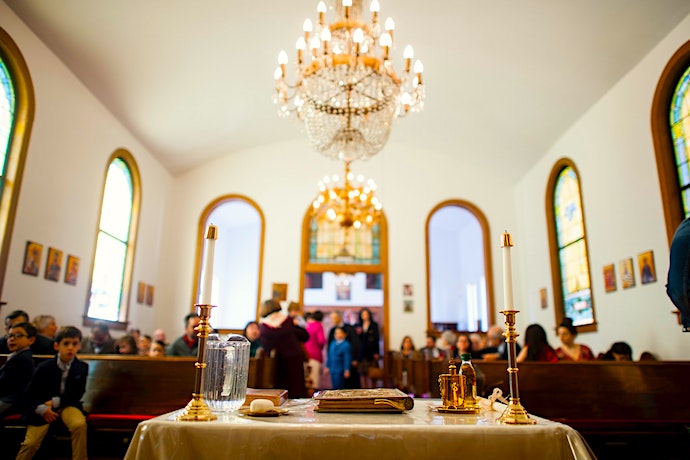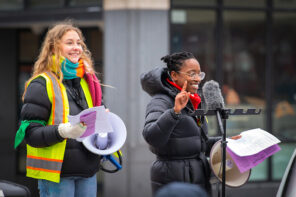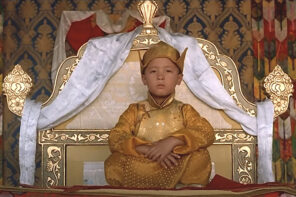Since the Russian invasion of Ukraine began three weeks ago, it’s likely you’ve heard the term Russian World (or Russkii Mir). It’s easy to conflate this concept with nostalgia for the Soviet Union (it’s just another term for Russia plus satellite states, right?), but the term—and the concept—predates the Soviet Union and Marx by centuries and bears the mark of Orthodox Christian political philosophy and history. It has, subsequently, underscored much of Patriarch Kirill of Moscow’s defense of the Russian invasion, as Daniel Schultz writes about here on RD.
This is why it’s significant that a declaration denouncing the concept of Russian World, with signatories from around the world—among them some of most important living Orthodox Christian theologians—appeared on the websites of two of the world’s leading centers for Orthodox Christianity, Volos Academy for Theological Studies and the Center for Orthodox Christian Studies at Fordham University.*
The Moscow Patriarchate has essentially responded through the personal website of Alexander Shipkov, one of its media liaisons. In the statement, Shipkov rejects the declaration published on “a Greek portal” as a “a purely political document that has nothing to do with genuine Christianity.”
It’s merely the most recent flare-up of the conflict within the Orthodox Christian world over its relationship to liberalism and Western modernity more broadly—and it motivates so much of the rhetoric on, if not the actual invasion of, Ukraine. The skirmish over “Russian World” in particular highlights the ways in which both sides of this conflict draw on legitimate elements of Orthodox Christian history and theology to support their position.
Moreover, it’s clear that the two sides are speaking primarily to one another, and not to the Western world whose values and norms are ostensibly at the center of this debate, as they call on events, thinkers, and practices virtually unknown to Western audiences.
These things, combined with the general lack of knowledge about Eastern Christianity in the West, make it easy for Western media and individuals to ignore this debate and consequently the significant religious dimension at the heart, not only of the conflict in Ukraine, but of Russian aggression writ large (not to mention the significant role of contemporary Eastern Christianity in other geopolitical “hotspots” like Syria, Turkey, and Cyprus). The erasure of the Eastern Christian presence in these situations in Western media and discourse clouds our understanding of significant parts of the global picture and renders flat a complex and multidimensional picture.
However, much worse than the erasure of Eastern Christianity and its culture is its complete conflation with Western Christianity, either by failing to acknowledge differences at all or by only highlighting Eastern Christianity through the stories of its Western converts (think about why its a problem that Richard Gere is probably the most famous Buddhist you can name outside of the Dalai Lama; not to mention the fact that, in the case of Orthodoxy, this often results in non-Western convert communities, such as in sub-Saharan Africa and South Korea, being completely ignored). This conflation ignores the very real history of conquest and occupation that occurred between Western and Eastern Christendom, in which the West has almost always been the aggressor, that stands as one of the foundations of modern Eastern Christian identity.
For example, the 1204 Sack of Constantinople by Crusaders, so pivotal in Orthodox Christian self-understanding, is virtually unknown in the West. Yet it underlies Patriarch Kirill’s defense of Russian aggression in Ukraine, even when it sounds to Western ears like standard conservative Christian fare. It also stands at the center of more progressive Orthodox Christian conversations, for example around colonialism as a paradigm for talking about the Eastern Christian experience. (Or Google the history of the Ukrainian Greek Catholic Church—it might surprise you.)
Conflation with Western Christianity also silences the ongoing and powerful debates within Eastern Christianity about the West that, as discussed above, is at the heart of so much contemporary geopolitical conflict: If all Christianity is Western in reality or origin, why would any Christian group need to negotiate its relationship with the West? If the conflicts within Eastern Christianity are only heard in the voices and experiences of its Western converts (voices and experiences free from the specific historical and generational trauma that pervades so many Eastern Christian cultures), why are its debates any different from those in the West?
In fact, Eastern Christianity (and the culture it arises from and produces) is unique—as distinct in many ways as Islamic or Confucian civilization is from the West. It has its own history, memory, values, and customs, all of which are distinct from its Western counterpart, despite a common source.
You may never have heard of Russian World or the Kyivan Rus or Holy Russia before this month. It’s possible you still only vaguely know what the Byzantine Empire was. That is okay. For now. But arguably the top six most religious countries in Europe are all Eastern Christian nations by heritage and identity. Inarguably, there are more Orthodox Christians in the US than Unitarians. This is not a fringe category. And as recent events in Russia highlight, Eastern Christianity, and its distinctiveness, can no longer be ignored.
###
*Full Disclosure: I’ve signed this declaration and do I believe the teaching of Russian World and other nationalists visions are heretical within the canonical and patristic tradition of the Orthodox Church. I also, however, recognize the prevalence of this kind of thinking within the history of Orthodox Christianity and in Orthodox Christian cultures. As I’ve tried to highlight on multiple occasions, there’s an on-going debate in Orthodox Christianity. As a practicing Orthodox Christian, I fall firmly on one side of that debate. As a historian, I acknowledge that the tradition is remarkably complex and provides evidence for multiple, frequently contradictory positions.





